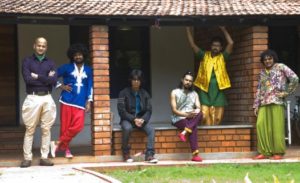Gavipuram: Nostalgia of the future
January 22, 2019
They compose music because they love it, and layer it with causes and beliefs that affect them personally. A conversation with Swarathma on music for a change.
It is a contrast of sorts. The video of Pyaasi, which talks about water scarcity and conservation, shows the protagonist, a little girl, running from pillar to post looking for drinking water. Cut to another resort-like setting where a bunch of hip men is indulging in its excess in swanky roof-top swimming pools without batting an eyelid. While the little girl walks for miles barefoot with her mud pot, lead singers Shubha Mudgal and Vasu Dixit (of Swarathma) croon in the background – “Pyaasi hoon main tumko pilake…. Ashq to behene do, paani hoon paani rehene do” In the end, the girl manages to fill her pot, only to find that it has numerous holes. Some of the images in the video are stark – large expanse of barren, cracked land, the girl’s tender, bare feet balancing across the stony path, grateful for even a drop; and contrasting images of the men amidst cool, blue water, splashing, playing, sun-bathing.
The latter are the members of Swarathma, the Bangalore-based band that wrote and composed the song. What struck me about the video, apart from its powerful message, was that the band is not shown playing or supporting the protagonist, as is usual. Instead, they are the sinners. And on a lazy Sunday morning when I got to meet them (finally!), I realized that this is just an extension of their core belief system as a band – not the in-your-face, slogan-shouting promotion of social change, but the restrained kind; more interested in their music and message than themselves. Like the quiet, unassuming teacher from 8th grade who volunteers to teach at orphanages after work because he feels deeply about it. Swarathma says that they compose music because they love it, and layer it with causes and beliefs that affect them personally. These may not always be popular causes, but ones that have touched them on a personal level.
Jishnu, the bass guitarist, says, “Our songs are based on something we see around us. And that gets expressed in a song. It happens naturally. Music is a channel, a medium of expression of our collective values.” And these collective values have led them to make music around issues like child sexual abuse, urbanization and a satire on politics in daily life, among others. Vasu, the lead singer, explains: “First it has to affect you. If it doesn’t, it definitely won’t reflect in the song.”
It’s the same sincerity that probably has allowed them to play the bad guys in their very first music video. They tell me that it is probably more realistic precisely because of that. Montry, the drummer, says, “See, I had no clue how difficult it is to get decent drinking water in rural areas. And we waste so much water in the cities! As we shot the video our own awareness increased. Now I’m more cautious, even if I’m just showering.” Vasu adds, “As a band, it’s not like we thought about water scarcity as an issue for years. But two of us (Vasu and percussionist Pavan) are from Mysore and hence more sensitive to the ongoing Kaveri dispute. We wanted to present it from the river’s point of view. That’s how we came up with lyrics of the river saying – ‘I’m just water. Let me be. Don’t build dams to hold me back.’ But even for us, it was only much later that the actual awareness came. Every time we perform the song we learn more about the ground realities….”
Having said that, Swarathma is very clear about what it does not want to do. In the drive for social change, they don’t want to veer away from what matters most to them – music. They insist that social change is incidental, and not a necessary pre-condition for them to make music. But the band continues to contribute to social causes, even if they are not introducing social messages in their songs.

For instance, they have initiated the Swarathma Action Replay concept, where, for every few paid shows that they perform, they also do a show for free. Typically, these are at child-care homes, rehabilitation centers, with the most recent one for IYCN (Indian Youth Climate Network). The band has done fund-raiser shows for Delhi-based YP Foundation and Chennai-based micro-credit organization Rang De. Eco-friendly plastic bags made by an organization called Small Steps to encourage people to move away from plastic are now given free along with Swarathma CDs. Jishnu, the MBA graduate in Swarathma puts it into perspective, “It’s different from contributing hard cash. When you contribute money, there is a conversion cost. Money doesn’t reach people in its entirety. So we do our bit by creating value through art. And this is the best way to reach people in an undiluted way.”
But with the success of Pyaasi do they see music working as a social concept in India, and also for them as a band? They tell me that music has always worked as a social concept in India, citing as examples Kabir’s songs and Bengali music composed during the independence struggle.
While the band is open to inspiration from various quarters, there’s no hunger to make music exclusively for social change. Maybe that’s not even necessary. When you just set out to make good music and stumble upon an issue that matters to you, and it turns out to be a thumping success like Pyaasi, enlisting support from renowned NGOs as well as veteran artists like Shubha Mudgal, you should just listen to yourself. After all, art is where the heart is.
This story appeared in The Alternative. Read the original here.


